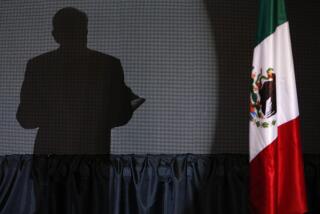Prosecutors in Camarena Case Want Limits on Questioning
Federal prosecutors are trying to prevent defense lawyers in the Enrique Camarena murder trial from cross-examining a prospective government witness who is reputed to have killed 35 to 50 people while working as an interrogator for Mexican law enforcement agencies.
The killings, carried out by Jesse Najar Zuno, were disclosed recently in documents that prosecutors turned over to lawyers for four men who are on trial in Los Angeles for the 1985 slaying of Camarena, a U.S. Drug Enforcement Administration agent who was based in Guadalajara, Mexico.
The documents stated that in his capacity as an interrogator and trainer for the Federal Security Directorate--Mexico’s equivalent of the FBI--and other government agencies from 1974 to 1987, Najar “killed 35-50 persons” but the documents offer no further details.
Najar is expected to testify against Ruben Zuno Arce, a Mexican businessman who has been indicted as one of the plotters of the Camarena murder.
Najar has worked as a DEA informant since October, 1986, and has been paid $32,440 by the agency for information and expenses since then, according to the government documents. He is one of 18 informants prosecutors say they plan to put on the witness stand.
In February, the U.S. attorney’s office in Los Angeles notified Najar’s lawyer, David Reed of Beverly Hills, that his client would be subpoenaed to testify at the Camarena trial. The letter stated that Najar was not considered a suspect in Camarena’s death and would get immunity in return for his testimony.
The Feb. 1 letter from Assistant U.S. Atty. Manuel A. Medrano, the lead prosecutor in the Camarena case, indicates only that Najar will be questioned about Zuno’s alleged role in the case. Zuno has proclaimed his innocence.
Reed has declined to discuss the killings attributed to his client.
Jury selection in the case began Tuesday before U.S. District Judge Edward Rafeedie and testimony is expected to begin next week.
A motion filed by prosecutors Medrano and John L. Carlton this week asked Rafeedie to issue an order prohibiting defense lawyers from making any reference to the killings attributed to Najar in opening statements to the jury, or even allowing them to cross-examine Najar about the killings.
The prosecutors say that defense lawyers should be prohibited from raising the killings because it could unfairly undermine his credibility as a witness. The killings, they stress, had nothing to do with the Camarena case.
Zuno’s lawyers said they would ask Rafeedie to deny the request, but declined to elaborate on their position Thursday.
However, two UCLA criminal law professors who have no connection with the Camarena case said they thought the prosecutors’ request should be denied because they consider the killings an appropriate subject for cross-examination.
“I’m astounded that the government would seek to prevent cross-examination on the killings,” said Prof. Robert Garcia, who was a federal prosecutor in New York from 1983 to 1987.
“The government is wrong when it says this does not go to truthfulness or veracity,” Garcia said. He noted that the judge has discretion under the Federal Rules of Evidence to determine whether past acts of violence affect a witness’ credibility.
The professor also said that if Zuno’s lawyers were not allowed to cross-examine Najar about the killings it could improperly infringe on his constitutional rights to confront a witness against him.
“The government’s claim is that it is unduly prejudicial” to ask about the killings, Garcia said. “Where is the prejudice in letting the jury know the truth?”
Prof. Peter Arenella of UCLA said the issue facing Rafeedie is whether a jury would be so “distracted and inflamed” by testimony about the killings that it would not be able to fairly judge the credibility of Najar’s testimony.
“The relevance of questioning him concerning his (alleged) killings of 35 individuals while in the employ of the Mexican government is clear,” Arenella said. “One implication from such an admission is that this is an individual who would be willing to do anything for the right price.”
Charles Weisselberg, a USC law professor, took a slightly different view.
He said the act of killing someone does not necessarily indicate that the individual would testify untruthfully. “I think the court will have to figure out the circumstances of the alleged killings, which would take a lot of time,” he said.
“The defense would be within its rights to ask about each of the killings,” to determine if there was anything about the nature of the killings that impugn Najar’s credibility.
Najar’s lawyer said that he thought the government may have grounds for keeping the defense from asking about the slayings because killing someone doesn’t make the person a liar. He said he could not reveal how the federal prosecutors obtained the information about the killings.
Camarena was abducted on a Guadalajara street in February, 1985. He was tortured and killed by drug traffickers and his body was found a month later at a ranch 65 miles outside that city.
Thus far, 22 people have been indicted in the United States and three have been convicted in Los Angeles in connection with the murder.
More to Read
Sign up for Essential California
The most important California stories and recommendations in your inbox every morning.
You may occasionally receive promotional content from the Los Angeles Times.










